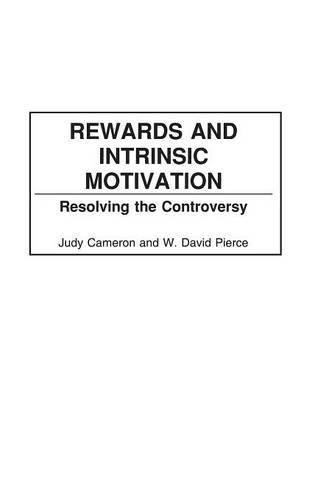
Rewards and Intrinsic Motivation: Resolving the Controversy
(Hardback)
Publishing Details
Rewards and Intrinsic Motivation: Resolving the Controversy
By (Author) Judy Cameron
By (author) W. David Pierce
Bloomsbury Publishing PLC
Praeger Publishers Inc
30th May 2002
United States
Classifications
Tertiary Education
Non Fiction
Sociology and anthropology
Organizational theory and behaviour
303.35
Physical Properties
Hardback
264
Description
Contrary to many claims, rewards do not have pervasive negative effects; instead, with careful arrangement of rewards, motivation, performance, and interest are enhanced. Over the past 30 years, many social psychologists have been critical of the practice of using incentive systems in business, education, and other applied settings. The concern is that money, high grades, prizes, and even praise may be effective in getting people to perform an activity but performance and interest are maintained only so long as the reward keeps coming. Once the reward is withdrawn, the concern is that individuals will enjoy the activity less, perform at a lower level, and spend less time on the task. The claim is that rewards destroy people's intrinsic motivation. Widely accepted, this view has been enormously influential and has led many employers, teachers, and other practitioners to question the use of rewards and incentive systems in applied settings. Contrary to this view, the research by Cameron and Pierce indicates that rewards can be used effectively to enhance interest and performance. The book centers around the debate on rewards and intrinsic motivation. Based on historical, narrative, and meta-analytic reviews, Cameron and Pierce show that, contrary to many claims, rewards do not have pervasive negative effects. Instead, the authors show that careful arrangement of rewards enhances motivation, performance, and interest. The overall goal of the book is to draw together over 30 years of research on rewards, motivation, and performance and to provide practitioners with techniques for designing effective incentive systems.
Reviews
[B]oth provocative and insightful....[W]ell worth the read...No clear solutions are given, but culture, media, and family suggestions are made throughout the book. We are reminded that there are more people who care than are violent. Understanding violence is one way to prevent it and to give hope. A helpful book is learning the language of violence.-Journal of Psychology and Christianity.
[I] recommend Cameron and Pierce. They present a balanced, thorough examination of the issue and their conclusions are well articulated and supported. It remains to be seen whether this work will truly resolve the controversy, but it does provide an interesting, useful piece in the puzzle. I highly recommend it.-John A. Lust, Professor of Management and Chair, Department of Management and Quantitative Methods, Illinois State University
"Both provocative and insightful....Well worth the read...No clear solutions are given, but culture, media, and family suggestions are made throughout the book. We are reminded that there are more people who care than are violent. Understanding violence is one way to prevent it and to give hope. A helpful book is learning the language of violence."-Journal of Psychology and Christianity.
"I recommend Cameron and Pierce. They present a balanced, thorough examination of the issue and their conclusions are well articulated and supported. It remains to be seen whether this work will truly resolve the controversy, but it does provide an interesting, useful piece in the puzzle. I highly recommend it."-John A. Lust, Professor of Management and Chair, Department of Management and Quantitative Methods, Illinois State University
"[B]oth provocative and insightful....[W]ell worth the read...No clear solutions are given, but culture, media, and family suggestions are made throughout the book. We are reminded that there are more people who care than are violent. Understanding violence is one way to prevent it and to give hope. A helpful book is learning the language of violence."-Journal of Psychology and Christianity.
"[I] recommend Cameron and Pierce. They present a balanced, thorough examination of the issue and their conclusions are well articulated and supported. It remains to be seen whether this work will truly resolve the controversy, but it does provide an interesting, useful piece in the puzzle. I highly recommend it."-John A. Lust, Professor of Management and Chair, Department of Management and Quantitative Methods, Illinois State University
Author Bio
JUDY CAMERON is an Associate Professor of educational psychology at the University of Alberta. W. DAVID PIERCE is a Professor in the Department of Sociology at the University of Alberta, Director of the Centre for Experimental Sociology, and retired Adjunct Professor in the Department of Neuroscience (Medicine).
